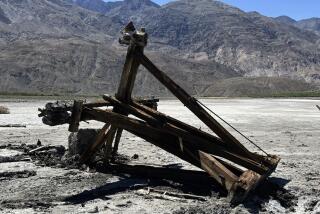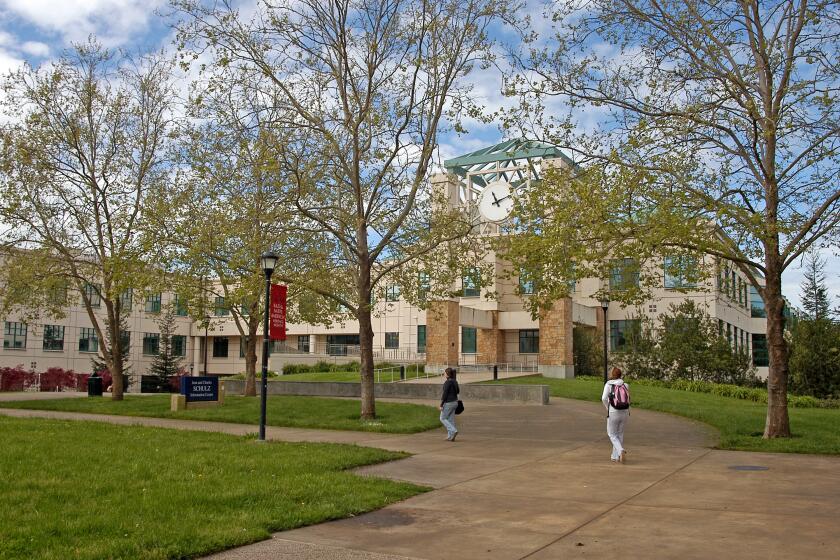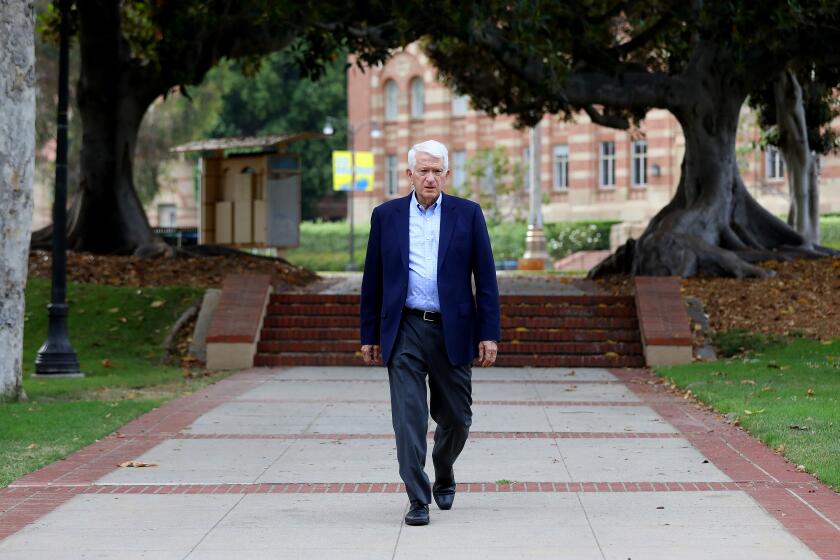Never at Loss for Words : San Jose’s Outspoken Police Chief Quits Amid Controversy
With a diploma from Harvard on the wall, a Jaguar in the parking lot and views on police work that would make the ACLU cheer, Joseph McNamara was never an ordinary cop.
“The heritage of American police,” McNamara, San Jose’s outgoing police chief, told a recent gathering of psychologists at a San Francisco airport hotel, “is one of corruption, police brutality and discrimination, and misuse of police powers for political purposes.”
That such words would come from a cop who spent 10 years walking a beat in Harlem might shock some people. But when it comes to speaking his mind, this son of a New York City patrolman has a certain modus operandi--he will speak candidly to almost anyone who asks.
McNamara has broadcast his views on all the news and talk shows: “Oprah,” “Donahue,” “Nightline,” name it. He has written opinion pieces for the Los Angeles Times and the Wall Street Journal.
Lately, at every opportunity, McNamara has aimed his mouth south, taking on Los Angeles Police Chief Daryl F. Gates. In interviews, talk show appearances, speeches and articles for newspapers, McNamara has called on Gates to quit.
“Like being an alcoholic or a drug addict,” McNamara said of the Los Angeles Police Department, “you can’t reform yourself unless you admit you have a problem. What I see happening there is denial.”
Gates won’t respond to McNamara, said a Police Department spokeswoman, though shortly after McNamara first spoke out against him, Gates called him “an oddball.”
McNamara is an in-demand public speaker, a Bay Area radio station commentator and a successful detective novelist. Over the years, he helped shape the national debate on gun control, becoming one of law enforcement’s earliest advocates of gun registration and the ban on assault weapons. He also came to symbolize what some would term “progressive” law enforcement, with his strong belief in affirmative-action hiring and the need for police to reach out to the community.
To his critics, McNamara is a self-promoter, a grandstander, someone who picked on Gates without having all the facts. In his early years in San Jose, some cops quipped that “he’d sell his mother on Mother’s Day for seven column inches and a photograph.” But as McNamara sees it, he was merely doing his job.
“If you just sit on your hands because someone is going to attack you as grandstanding, then you’ve sold out,” McNamara said. “That’s the trouble with this country. Our politicians are like that. They are unwilling to take any risks, unwilling to take a position on the vital issues of the day.”
So speak out he does:
On policing: “We are not the New Centurions, the soldiers who keep the barbaric hordes from destroying civilization. We’re there to enforce the laws and serve the community as part of the community. We don’t get our authority from our guns and clubs. We get our authority from the people.”
On the National Rifle Assn.: “They oppose anything that makes people think twice about guns,” and, “They have cowered politicians to a remarkable degree.”
At the psychologists’ convention, he blasted America’s “Rambo mentality” that fosters the belief that guns offer safety to their owners. Then he spoke of children who get killed by guns, and quoted from a gun magazine that describes assault weapons’ utility in “warfare” and their effectiveness against the “enemy.”
“Where is the war, and who, in the name of God, is the enemy?” McNamara asked. “Were the innocent people killed in McDonald’s restaurant the enemy? Were the children in the Stockton schoolyard the enemy?”
Now, McNamara is turning to drug policy. At age 56, with a history of heart trouble, McNamara is leaving police work, having accepted an offer to join the Hoover Institution at Stanford University. There, he will search for a middle ground between filling prisons with drug dealers and legalization. He also will do commentary for a San Francisco-based public radio station, KQED-FM.
With his final day in uniform having been May 24, McNamara said, “This is an emotional time for me.” Some of the emotion is personal. With his three children out of college, he and his wife are divorcing after 26 years. It’s one topic he won’t discuss in any detail.
As San Jose searches for a replacement, many city officials, beat cops and community activists lament McNamara’s departure.
“When he came in, the department was at a low ebb,” said Mayor Susan Hammer. “That has really changed. It is a department by and large respected by the community.”
Joe Brito is also sad to see McNamara go. An activist who is quick to say police chiefs aren’t his “favorite people,” Brito had been demanding a citizens’ review board to oversee the police before McNamara arrived. “When he got here, there was no need” for such a board, Brito said.
“All in all, this place is better because he passed through,” said Officer Carm Grande, who had “hellish arguments” with McNamara over the years. Grande is past president of the Police Officers Assn., which bargains on behalf of officers.
Grande credits McNamara with affirmative-action hiring and ending elitism in the department by rotating officers at least every five years. Under the policy, detectives return to patrol after five years, while patrol officers can move into investigative slots.
As McNamara leaves, San Jose remains among the safest big cities in the country. Since 1976 when he arrived, the city boomed from a population of 564,000 to 791,000. But reported felonies dropped from 30,259 in 1976 to 25,390 last year. In 1976, a force of 711 officers made 4,145 felony arrests. Last year, a force of 1,170 police made 9,151 felony arrests.
McNamara came to San Jose from Kansas City, Mo., where he spent three years as chief. Before that he was on the New York City force, beginning in 1956 as a patrolman in Harlem. While a New York cop, he was accepted into a criminal justice fellowship at Harvard, then received his doctorate from Harvard in public administration.
He has his share of war stories from his days in New York, such as the one about the young man who was fumbling in the garbage under a stairwell, then turned on McNamara, aiming a gun at his gut.
“I tensed, bracing, as if somehow you could ward off that piece of lead. Here is a kid I could have knocked down with one hand who held my life in the balance. I heard this magnificent, authoritative voice say, ‘Give me that damned thing!’ It was me. The training took over. And that was the day I became a real advocate of gun control.”
When he arrived in California, McNamara was convinced that the department had deep troubles. In one of his first steps, he demanded that a handful of top brass resign. One who refused was Deputy Chief Bob Allen. McNamara responded by forcing Allen to take a medical retirement, citing a hearing loss brought on by gunshots at target practice, a condition that also afflicts McNamara.
“Absolute loyalty was not simply nice, but necessary,” said Allen, who left the department in 1978 after 22 years, and became chief in Capitola, near Santa Cruz. Allen and other old-timers insist the department was good when McNamara arrived. McNamara merely fine-tuned it. But Allen also has praise for his former boss.
“I think he’s done very well,” Allen said.
McNamara beefed up Internal Affairs, and moved it from police headquarters to a building where officers can bring complaints discreetly. Under McNamara, officers were disciplined for cursing at suspects and making racist comments. He disciplined an officer for calling another officer who had testified in a police misconduct case a “snitch.”
His disciplinary policies brought criticism from some officers and their advocates. Daniel Jensen, a lawyer who has represented several San Jose officers accused of wrongdoing, charged that McNamara played “politics with officers’ lives” by meting out overly harsh discipline to avoid “political embarrassment.” He believes McNamara’s attack on Gates is merely the latest example of posturing.
“How about the presumption of innocence? How about due process? If it is politically expedient, he’ll get up on a soap box and condemn,” said Jensen, who estimated he has helped 10 officers win back their jobs after they were fired by McNamara.
Jensen is a former San Jose officer who felt McNamara’s wrath, having been disciplined in 1978 for shooting out a tire of a car he was tailing in a high-speed chase. “It worked out,” Jensen said. “Nobody got hurt.”
In the last year, three San Jose officers have been fired for unnecessary force. An investigation continues into an incident last year in which a man, who was arrested for being drunk in public and resisting arrest, was sprayed with Mace as he sat handcuffed in the back of a squad car.
Given McNamara’s view of discipline, it came as little surprise that when he appeared on a talk show on March 8, he talked about the Rodney G. King beating five days before. During discussions with host Michael Krasny of KGO in San Francisco, McNamara stopped short of calling for Gates’ ouster.
Then Krasny took a call from a man who accused McNamara of hypocrisy for refusing to say whether he thought Gates should quit, while condemning officers who let the beating go on and failed to tell supervisors about it.
That prompted McNamara to speak out. “ ‘Of course I think he should resign,’ ” he recalled saying. “ ‘How in the world could the minority community have any faith in that department while he’s still at the head?’ ”
Krasny always had found McNamara to be an outspoken, informed guest. But even he was taken aback by McNamara’s call for Gates to quit, given the “fraternity among men in blue.”
In the weeks since, McNamara has received some praise for his stand. Jesse Jackson wrote a letter thanking McNamara for his “moral courage.” But many others attacked him, such as the wife of a Los Angeles detective who wrote: “You should be ashamed of yourself.” The San Jose Police Officers Assn. also criticized his stand.
At a recent training seminar for his officers, McNamara raised the issue again, condemning the code of silence that allowed the beating to take place with 21 officers at the scene.
In most cities, he said, the chief would not have had time to resign. He would have been fired, he said, and he called Gates’ characterization of his detractors as cop haters “bizarre.”
“That tape has cast a cloud over the credibility of all police,” McNamara said. “It is incumbent upon the chiefs--people like me--to say that, ‘Hey, that is not what’s going on.’ No one is going to believe you if you say it is just an isolated incident. It is self-evident that it couldn’t have been.”
Even as he leaves police work, controversy follows. “My degree of hate mail has increased markedly,” Hoover Institution Director John Raisian said, noting that gun lovers who despise McNamara filled his mailbox.
Raisian knew of McNamara’s position on gun control. But he offered him the post at the conservative think tank before McNamara called for Gates to quit. The stand took some at Hoover by surprise. But Raisian still would have offered him the position. “One incident doesn’t color it one way or another for me,” he said.
McNamara shrugged off the institution’s reputation as being a center of conservative thought. Raisian knew what he was getting, McNamara said. “It is sort of self-evident that you don’t offer a fellowship to someone like me if you want to program them.”
San Jose: Then and Now
In the 15 years since Police Chief Joseph McNamara took over San Jose’s force, the city’s population has grown by 40% but index crime has dropped by 9%. Here are the seven so-called index crimes tracked by the FBI: 1976
Population: 564,000
CRIME NUMBER CLEARED Homicide 38 28 Rape 313 136 Robbery 974 271 Assault 1,236 647 Burglary 13,112 1,361 Auto Theft 4,243 248 Larceny 22,096 4,938 Total 42,012 7,629
1990
Population: 791,600
CRIME NUMBER CLEARED Homicide 35 21 Rape 416 218 Robbery 1,034 325 Assault 3,213 1,716 Burglary 5,752 388 Auto Theft 4,205 469 Larceny 23,435 4,518 Total 38,090 7,655
SOURCE: City of San Jose
* A case is considered cleared after a criminal complaint is obtained from the district attorney and suspects are in custody.
More to Read
Start your day right
Sign up for Essential California for news, features and recommendations from the L.A. Times and beyond in your inbox six days a week.
You may occasionally receive promotional content from the Los Angeles Times.






